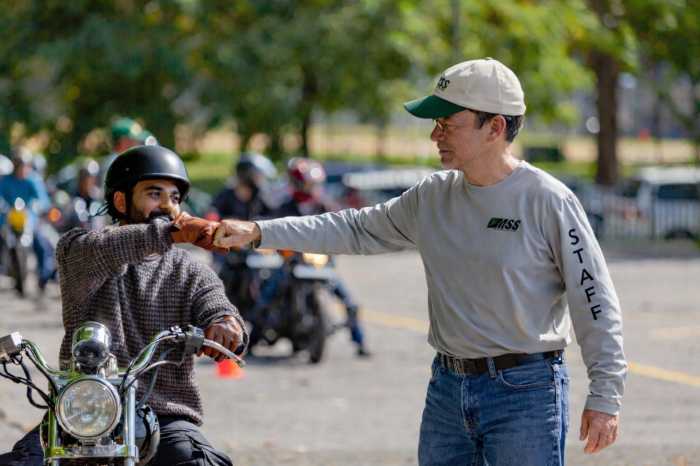For pianist Jonathan Biss, performing for
an audience carries with it heavy responsibilities. .
"I believe very strongly that if you play the music that
you love, with commitment, then you can stretch the boundaries
of what’s ’acceptable’ to an amazing degree," the pianist,
who performs at Bargemusic Jan. 16-19, told GO Brooklyn.
Referring to the fact that he enjoys playing 20th-century music
that is not often heard in recitals, Biss said, "We, as
performers, need to be much more open to audiences in order to
allow them to open up to the music, whatever it is. If you can
get an audience to listen, then you’ve done enough. If not, you’re
not doing your job."
Biss, who at the tender age of 22 has been playing piano for
16 years, has certainly been doing his job, and his Bargemusic
programs, mixing the familiar with the obscure, have become his
hallmark.
Back in November, Biss made his local recital debut at the Metropolitan
Museum of Art, performing three Beethoven sonatas alongside lesser-known
works by two iconoclastic contemporary composers – Leon Kirchner
and Toru Takemitsu – that won raves from critics and audiences.
While his performances at Bargemusic aren’t as daring, both
programs enticingly offset "known" and "unknown"
works. For Biss, the venue itself became part of his process
for selecting what to play.
"[The barge] is intimate and a little off the beaten path,
so it was a golden opportunity to play things you feel passionately
about," he explained. "I was told that I could program
whatever I wanted, so I did."
The program for Thursday and Friday dives headlong into the
unjustly neglected by opening with Czech composer Leos Janacek’s
Sonata for Violin and Piano. Two more celebrated works follow,
namely, Johannes Brahms’ first Violin Sonata and Robert Schumann’s
B-minor Violin Sonata. Playing the violin is Miriam Fried, Biss’
mother.
"We’ve played quite a few programs together, actually,"
he explains, "and the Brahms sonata was one we definitely
wanted to do. Janacek is a pet composer of mine, and I think
his sonata is a fantastic piece that deserves to be played more.
The Schumann sonata, I thought, would be a good complement to
the Brahms sonata. I love Schumann, and I think his work is less
heard than it should be, especially his late chamber music."
The program on Saturday and Sunday finds Biss exploring the
Germanic solo piano repertoire in the first half – Alban Berg’s
Piano Sonata, Arnold Schoenberg’s "Six Little Pieces for
Piano" and Beethoven’s Piano Sonata No. 31 – and teaming
with violinist Mark Peskanov, violist Toby Hoffman and cellist
Samuli Ornstromer to play Brahms’ expansive Piano Quartet No.
2.
"I adore that Brahms quartet, but since it’s almost 50
minutes long, the idea for the first half was to program shorter
solo pieces," he said.
Biss had no qualms about programming music by Berg and Schoenberg,
two members of the Second Viennese School from the early part
of the 20th century, alongside the more familiar Beethoven and
Brahms.
"The Berg and Schoenberg [works] are a combination I like
a lot," he said.
"The Berg sonata is very neo-romantic and the Schoenberg
pieces are expressionist and less immediately appealing,"
Biss said, which is why he programmed the Berg work first in
the recital. "Berg’s sonata brings you into a state where
you can listen to that sort of music, and I think it’s interesting
to juxtapose the Beethoven with both Berg and Schoenberg."
Biss realizes that there are those in the classical-music audience
who remain resistant to "new" music, even if it was
composed nearly a century ago. But he also knows that part of
his job is to try and change such sentiments.
"There’s no way to fight an attitude like that except by
going out and playing the music, which I do," said Biss.
"At the end of the day, I, myself, don’t love any music
more than I love Beethoven or Mozart, but I believe that the
music of our time is relevant, and when I find myself convinced
by a certain piece of music, I am committed to playing it."
For Biss – who makes his first recording for EMI Classics this
spring of piano music by Beethoven and Schumann – playing different
genres, styles and periods of music is ingrained in his blood.
"Growing up in a musical family maybe helped me explore
all kinds of music, which to me is just a natural progression,"
he said.
What isn’t so natural for Biss is performing on a body of water,
which he readily admits.
"I’m looking forward to playing there, although I am worried
about getting seasick while I play," he exclaimed. "I
have [felt sick] a couple times that I’ve attended concerts there,
so I might take some Dramamine. I may come off as a big hypocrite
because I’ve always been high-minded about performers taking
anything while performing, but I’ll see how I feel after rehearsal."
Jonathan Biss performs at Bargemusic
Jan. 16, 17 and 18 at 7:30 pm and Jan. 19 at 4:30 pm at Bargemusic,
anchored on the East River at Fulton Landing. Tickets are $35,
$25 seniors (Thursdays only) and $20 full-time students. For
more information, visit www.bargemusic.org
on the Web.
























